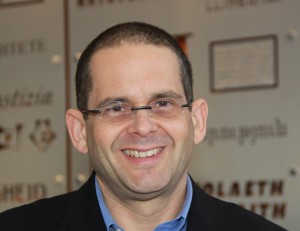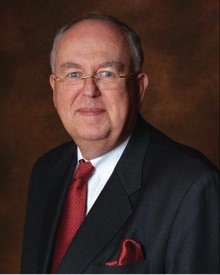The sixth installment of the Presidential Lecture Series, hosted by President John L. Anderson, will be held on Tuesday, March 11, 2014.
John W. Rowe, IIT Regent, Former Chairman of the Board, and Chairman Emeritus of Exelon Corporation, will introduce the lecture titled: “U.S. Immigration Law: History, Theory, and Political Implications,” presented by Mark Rosen.
Historically, the United States has not had a single, conceptually coherent approach to immigration. To provide a very partial overview, a complete absence of federal immigration restrictions during our country’s first century first gave way to piecemeal legislation that excluded certain races and nationalities (like the Chinese) and perceived undesirables (prostitutes and the feeble-minded), then to quotas favoring immigrants from western Europe, and preferences for immigrants from nations to which the U.S. believed it had special responsibilities (like Vietnam). Contemporary immigration law is the product of tens of separate statutes, and is an uneasy amalgamation of divergent impulses.
The absence of a coherent immigration policy in U.S. immigration law is unfortunate for many reasons. One is that, as a matter of political theory, there are many approaches to immigration that are consistent with a liberal democratic form of government. For example, a country plausibly could (though need not) take account of whether a would-be immigrant would further, or undermine, its political culture. And there is a wide range of potential political cultures from which a liberal democracy might choose.
In fact, immigration policy is deeply connected to what a country understands citizenship in its country, and its political culture, to be. One implication is that instead of continuing to enact piecemeal immigration laws that perpetuate cacophonous policies, it may be preferable to reframe our country’s immigration debates into a nationwide consideration of what it means to be an American. This holds the promise of laying a foundation for a coherent approach to immigration. Doing so also would allow us to see that immigration policy is not an island unto itself, but that it has implications for many other areas of law, for instance religious freedom and education policy.
Finally, although the U.S. Constitution grants the federal government ultimate say over immigration law, the States have authority to adopt what in effect are immigration policies vis-à-vis matters unregulated by the federal government. There may be benefits to allowing the States to serve as laboratories for many of the deeply contested.
Watch the previous Presidential Lecture Series videos here.
Tuesday, March 11, 2014
3:30 pm – Lecture, Hermann Hall Ballroom
5:00 pm – Reception, Hermann Hall Gallery
RSVP to the President’s Office no later than March 4, 2014. Please phone 312.567.5196 or email hmatson@iit.edu.
About the Speaker:
Professor Mark D. Rosen teaches constitutional law, conflicts of law, election law, local government law, Federal Indian Law, and civil procedure, and has served as a consultant to Congress, many state legislatures and attorneys general, and to Native American tribes.
Professor Rosen’s writings have addressed matters of international and domestic justice, as well as many issues of constitutional law. His published work has appeared in the Harvard Law Review, the Virginia Law Review, the California Law Review, the University of Pennsylvania Law Review, the Texas Law Review, the University of Chicago Law Review, the Minnesota Law Review, the University of Illinois Law Review, the William & Mary Law Review, the UCLA Law Review, the Notre Dame Law Review, the Chicago Journal of International Law, the Virginia Journal of International Law, the Wisconsin Law Review, the Journal of Law, State and Religion, Constitutional Commentary, the Journal of Contemporary Legal Issues, the Emory Law Journal, and others.
In addition to IIT Chicago-Kent College of Law, Professor Rosen also has taught at the University of Chicago Law School, the Northwestern University School of Law, and the University of Minnesota School of Law.
About the Moderator:
John W. Rowe is chairman emeritus of Exelon Corporation.
Mr. Rowe previously held chief executive officer positions at the New England Electric System and Central Maine Power Company, served as general counsel of Consolidated Rail Corporation, and was a partner in the law firm of Isham, Lincoln & Beale. He is the lead independent director of Northern Trust Company and a member of the board of directors of The Allstate Corporation and SunCoke Energy.
Mr. Rowe serves as chairman of New Schools for Chicago and The Field Museum, and as president of the Wisconsin Alumni Research Foundation. He is a member of the board of the Illinois Holocaust Museum, the Morgridge Institute for Research, the Northwestern University Settlement House and Chicago Shakespeare Theater. He is an IIT Regent and former Chairman of the Board of Trustees.
The Rowe Family Trust has founded the Rowe Professorship of Architecture and the Rowe Chair in Sustainable Energy at IIT, the Rowe Professorship in Byzantine History and the Rowe Professorship in Greek History at the University of Wisconsin, the Rowe Professorship in Virology at the Morgridge Institute and the Wisconsin Alumni Research Foundation, and the Curator of Evolutionary Biology at The Field Museum. The trust co-founded the Rowe-Clark Math and Science Academy and the Rowe Elementary School. The Rowes serve as patrons of the Pope John Paul II parochial school on Chicago’s southwest side.
Mr. Rowe holds undergraduate and law degrees from the University of Wisconsin, where he was elected to Phi Beta Kappa and the Order of the Coif. He has also received that university’s Distinguished Alumni Award.
John Rowe and his wife, Jeanne, reside in Chicago.


